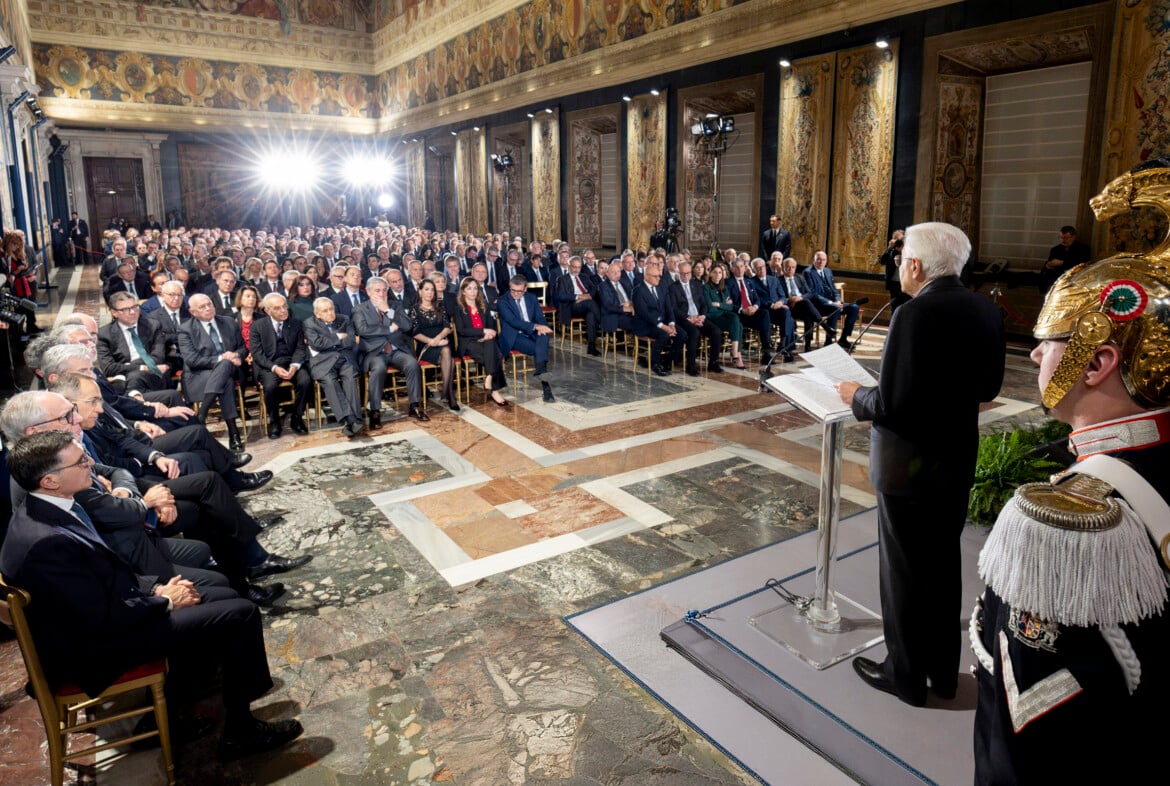Reportage
Sergio Mattarella: Those who govern must not fuel divisions
In his annual end-of-year address, President Mattarella said the only “guarantee” in the face of the growth of these extra-state powers is “the maintenance and consolidation of democratic institutions, the only curb on the usurpers of sovereignty.”

In the face of the many “fault lines” undermining the political and social fabric of our democracies, Italian President Sergio Mattarella sent a message to all those who hold institutional positions. He recalled the “sense of duty that requires all those who work in any institution to respect the limits of their role. Without encroachment, without overlapping, without enmity,” and “regardless of political affiliations.”
“The Republic lives by this order. It needs the trust of the people, who must be able to see harmony between institutions in the behavior and acts of those with roles of responsibility.”
He was speaking before the holders of the highest offices in the Italian state for the traditional end-of-year greetings held at the Salone dei Corazzieri at the Quirinale Palace. Without alarmism – which is simply not in his DNA – he described an Italy exposed to many risks, which stem both from wars that “sow deep fear, division and hatred” (which is why it is necessary to “reiterate, with strength and conviction, the case for peace”), and also from polarization and divisions that limit the space for “dialogue and mediation” and lead to a “radicalization that claims to simplify by rejecting listening and reducing complexity to the categories of friend/enemy.”
“There is a risk that no areas will be safe from this trend towards the incomprehensible divergence of views,” warned the President, citing conflicts over vaccines and climate change as examples of issues on which the clash is unable to arrive at “calm common reflection.” Hence his appeal to those who exercise the greatest responsibilities in the institutional field, to those in power who must take into account that the rate of abstentionism is weakening democracy, with the risk of it turning into “a democracy without people and populated with phantasms.”
According to the President, the antidote to these risks cannot be merely the “stability” of governments, or job growth, but rather rediscovering “the spirit of service, civic passion, the sense of duty.” He didn’t limit himself to mentioning this “gold mine of values” in an abstract sense: he mentioned concrete examples, including mayors, UNIFIL soldiers in Lebanon, and so many expressions of civil society. He called on high officials to “be able to live up to our responsibilities. To be able to manage them with the same commitment and the same confident determination with which so many of our fellow citizens, faced with difficulties, keep their families and our communities going every day.”
Prime Minister Giorgia Meloni was in the front row, listening. Obviously, the President's speech would never make any explicit references to her Atreju rally on Sunday, in which the premier went on an attack spree against various opponents, including CGIL union leader Landini and former EU commission president Romano Prodi. But it’s hard to imagine that her ears were not burning when the head of state urged to avoid the “constant search for enmity,” recalling that “the institutions belong to everyone” and calling for “appropriate behavior.”
As he did last December, the President also analyzed other serious risks facing democracies: namely, those posed by the “concentration in very few hands of enormous capital and technological power, as well as the centralized control of data.” He clarified that he wasn’t talking about Elon Musk specifically, “as some might interpret,” but about all those individuals, although small in number, “with immense financial assets, who earn well over 500 times the salary of a factory worker or office worker. Large corporations that dictate their terms to the markets and – putting themselves above the borders and authority of states and international organizations – tend to evade all regulations, starting with tax obligations.”
Mattarella once again denounced the risks posed by these individuals and entities that pursue wealth as “an instrument of power that allows them to be disengaged from any effective public authority.” Even to the point of challenging the monopoly of the state over force and currency, foundations of the modern state that is in danger of being emptied out. The only “guarantee” in the face of the growth of these extra-state powers is “the maintenance and consolidation of democratic institutions, the only curb on the usurpers of sovereignty.” And if there is creeping doubt inside democracies themselves about their alleged slowness to react or inadequacy when dealing with changes in technology and the economy, for Mattarella there can be only one answer: “We must love democracy and look after it.”
How can one do that? By avoiding “conflicts and radicalizations” that lead to “a desertification of the civil fabric” that can leave “the field open to escapades of all kinds.” And also by “supporting pluralism, in social institutions as well as in information,” and not relying only on “market logic.” All those he might have been addressing with his words were present on Tuesday evening at the Quirinale Palace. Starting with Meloni.
Originally published at https://ilmanifesto.it/mattarella-chi-governa-non-alimenti-divisioni on 2024-12-18
